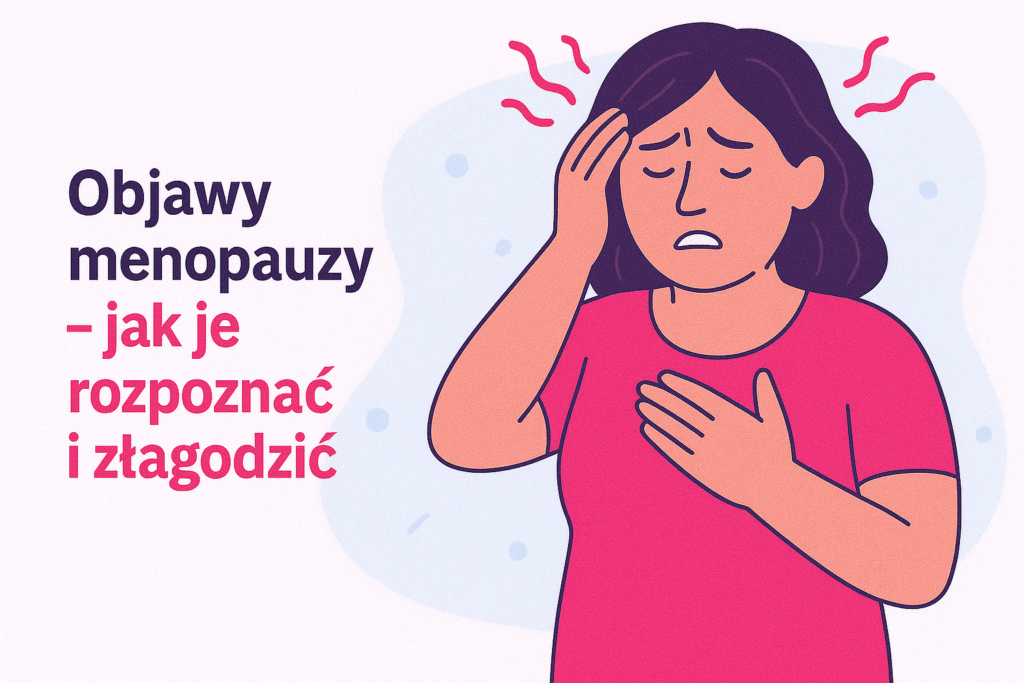Menopause is a natural stage in a woman’s life, associated with the decline of ovarian hormonal activity. The average age of menopause is around 51, although it can occur earlier or later¹. While it is a physiological process, its symptoms can significantly impact quality of life. Early recognition and appropriate action can help relieve many discomforts.
Most Common Menopause Symptoms
Menopause symptoms can vary greatly and depend on many factors – including genetics, lifestyle, diet, stress levels, and physical activity. The most frequently reported issues include:
- Hot flashes: experienced by 75–80% of women², often accompanied by excessive sweating, especially at night.
- Sleep disturbances: difficulty falling asleep, waking during the night, insomnia³.
- Mood swings and irritability: caused by fluctuations in estrogen and progesterone levels⁴.
- Vaginal dryness and decreased libido: linked to mucosal atrophy⁵.
- Menstrual irregularities: irregular cycles, increasingly infrequent periods leading to complete cessation.
- Weight gain and body shape changes: often despite unchanged eating habits.
- Heart palpitations, joint pain, memory problems, fatigue.
Many women also experience decreased self-confidence, increased sensitivity to stress, and anxiety.
How to Know It’s Menopause?
Menopause is diagnosed retrospectively – when at least 12 months have passed since the last menstrual period⁶. However, many symptoms may appear earlier, during the perimenopausal phase, which can last 5–10 years.
To confirm the diagnosis, a doctor may order tests for:
- FSH (follicle-stimulating hormone) – usually elevated
- Estradiol – usually decreased
- TSH – to rule out thyroid disorders
What Intensifies the Symptoms?
Certain factors can worsen menopause symptoms, including:
- Smoking
- Low physical activity
- Chronic stress
- Diet low in phytoestrogens and fiber
- Sleep deprivation
- Alcohol and caffeine consumption⁷
How to Relieve Menopause Symptoms?
Lifestyle Changes
- Physical activity: regular aerobic exercise (e.g. brisk walking, cycling) can reduce hot flash frequency⁸.
- Healthy diet: rich in vegetables, legumes, whole grains, and omega-3 fatty acids.
- Stress reduction: yoga, meditation, cognitive behavioral therapy.
Natural Support
- Phytoestrogens: e.g. soy, red clover, flaxseed – exhibit estrogen-like effects⁹.
- Herbs: black cohosh (Cimicifuga racemosa), ginseng, chaste tree.
Hormone Replacement Therapy (HRT)
- Effective in reducing hot flashes, sleep disturbances, and vaginal dryness.
- Requires individual medical assessment due to possible side effects (e.g. thrombosis, breast cancer in some women)¹⁰.
Local Therapies
- Estrogen gels, vaginal suppositories – help with vaginal dryness without systemic effects.
Psychological Support
- Talking to a therapist or joining a support group can improve emotional well-being and comfort.
When to See a Doctor?
It’s worth consulting a gynecologist or general practitioner if:
- Symptoms are severe and interfere with daily functioning
- Periods become irregular before age 40
- Sudden bleeding occurs after a period of amenorrhea
- Severe depressive or anxiety symptoms appear
Przypisy
- Freeman EW. Physiology of menopause. Obstet Gynecol Clin North Am. 2011.
- National Institute on Aging. Menopause: Time for a Change. NIH.gov.
- Kravitz HM et al. Sleep Difficulty in Midlife Women: A Community Survey. Obstet Gynecol. 2003.
- Schmidt PJ et al. Estrogen replacement in perimenopause-related depression. Am J Obstet Gynecol. 2000.
- Mac Bride MB et al. Vulvovaginal atrophy. Mayo Clin Proc. 2010.
- WHO Scientific Group. Research on the menopause in the 1990s. WHO Technical Report Series, 1996.
- Thurston RC et al. Menopausal symptoms and risk factors. J Womens Health. 2008.
- Elavsky S, McAuley E. Physical activity and symptoms of menopause. Health Psychol. 2005.
- Messina M. Soy and health update. Nutrients. 2016.
- Sturdee DW, Pines A. Updated IMS recommendations on postmenopausal hormone therapy. Climacteric. 2011.

